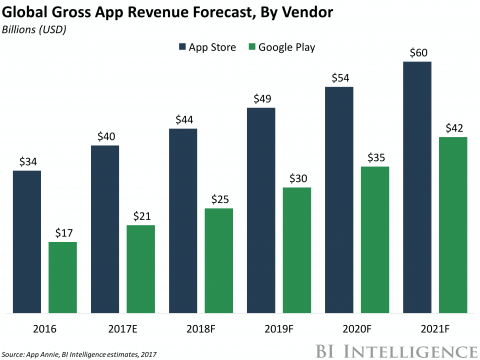In 2009, Apple coined the phrase “there’s an app for that,” and within six years, its prophecy had been fulfilled.
Apps had become the primary way people navigate the internet, overtaking mobile and desktop web browsers. And now they account for the vast majority of time spent on mobile devices.
But, despite this dominance, an intensifying engagement crisis is putting the ecosystem at risk. App usage is consolidating and once they’ve tried an app, users mostly aren’t coming back for more.
This shift could usher in a “post-app” era, which could transform the way consumers access the internet and digital services. Mobile tech giants Apple, Facebook, and Google have each put in motion strategies that best ensure they emerge not only unscathed, but ahead of their competition. At stake is the dominance of an industry projected to reach $102 billion in value globally by 2020.
In a new report, BI Intelligence explores the pros and cons of how the three biggest players in the Western mobile market are working to navigate the changing app landscape and how their respective initiatives best position them to come out on top. We lay out barriers standing in the way of adoption of the new technology. We also demonstrate the necessity for businesses to take heed of the evolving app market, and show where the best opportunity lies.
The report also notes the following:
- Users are downloading apps less often and spending their time in fewer of the apps that they choose to install.
- That’s a big problem for Google, Apple, Facebook, and the companies that rely on their app ecosystems to reach audiences.
- These players in tech are looking for ways to overcome a crisis in app engagement and position themselves to dominate the future app landscape.
- The evolving app ecosystem will provide brands with ample opportunity to leverage multiple points of engagement.
Get the full report here by BI Intelligence



